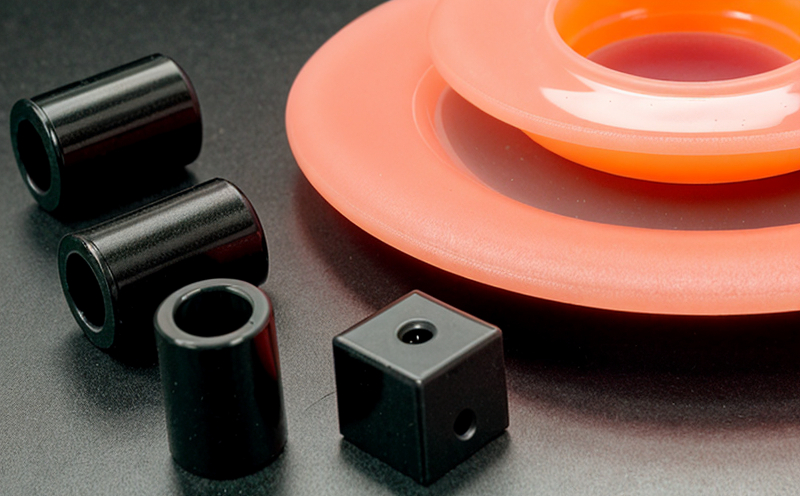JIS K 7113 Tensile Testing of Plastic Leisure Materials
The Japanese Industrial Standard (JIS) K 7113 specifies the method for tensile testing of plastic leisure materials. This test is crucial in ensuring the quality and safety of plastics used in sports and recreational products, where durability and performance are paramount.
Tensile testing evaluates how a material behaves under tension, measuring its strength and elongation properties. For plastics in the leisure sector, this information is essential for product design and development, as well as for compliance with international standards. The test involves pulling a specimen at a constant rate until it breaks, recording the force and extension at various points during the process.
Materials commonly tested under JIS K 7113 include those used in sporting goods such as golf clubs, tennis rackets, and surfboards, as well as other leisure products like playground equipment. The test ensures that these materials can withstand the stresses they will encounter during use without breaking or deforming.
The specimen preparation for JIS K 7113 involves cutting a sample to specific dimensions based on the type of plastic being tested. For instance, specimens are typically rectangular in shape with a flat surface area and parallel sides. The length-to-thickness ratio is carefully considered to ensure accurate results.
Instrumentation used in this test includes universal testing machines capable of applying controlled loads at a constant rate. These machines can measure force, extension, and other parameters throughout the testing process. Software associated with these machines collects data and generates reports that provide detailed information on how the material behaves under tension.
The test procedure involves attaching the specimen to the clamps of the testing machine and applying a specified load at a controlled rate until the sample breaks or reaches its maximum elongation. The force applied, extension achieved, and any other relevant data are recorded and analyzed. This information is used to determine key properties such as tensile strength, yield strength, elongation at break, and modulus of elasticity.
Understanding these properties is critical for quality managers, compliance officers, R&D engineers, and procurement professionals who need to ensure that the plastics used in leisure products meet strict safety standards. By adhering to JIS K 7113, manufacturers can guarantee their products' performance and reliability, thereby enhancing customer satisfaction and maintaining a strong market position.
The importance of this test cannot be overstated, particularly for industries where product integrity is crucial. It ensures that the materials used in sports and leisure products are robust enough to withstand the demands placed on them during use, thus protecting consumers from potential hazards.
Why Choose This Test
Tensile testing under JIS K 7113 is a cornerstone of quality assurance for plastic materials in sports and leisure applications. By choosing this test, organizations can ensure that their products meet the highest standards of performance and safety.
- Accurate Data Collection: The use of advanced testing machines allows for precise measurement of force and extension, providing reliable data on material properties.
- Compliance with International Standards: Adhering to JIS K 7113 ensures that products meet the stringent requirements set by international standards bodies, enhancing market access and customer trust.
- Risk Mitigation: By identifying potential weaknesses in materials early on, this test helps prevent product failures and associated risks, protecting both manufacturers and consumers.
- Competitive Advantage: Ensuring that products meet or exceed industry standards can give a company an edge over competitors, leading to increased market share and customer loyalty.
- Economic Benefits: Reducing the likelihood of product recalls and warranty claims through rigorous testing can save significant costs for manufacturers.
- Customer Satisfaction: Providing products that are safe, reliable, and perform as expected enhances customer satisfaction and fosters brand loyalty.
- Innovation: Understanding material properties in detail allows for the development of new and improved products, driving innovation within the industry.
- Sustainability: By selecting materials that meet high standards, manufacturers can contribute to more sustainable practices, aligning with growing consumer expectations and regulatory requirements.
In summary, choosing JIS K 7113 tensile testing is a strategic decision for any organization involved in the production of sports and leisure plastics. It not only ensures compliance but also supports quality, safety, innovation, and sustainability.
International Acceptance and Recognition
The JIS K 7113 tensile test is widely recognized and accepted globally for its reliability and accuracy in assessing the mechanical properties of plastic materials. This international acceptance is particularly significant given the increasing global market for sports and leisure products.
Many countries have adopted or referenced JIS standards, including China, South Korea, Taiwan, and various European nations, emphasizing the standard's credibility across different regions. The test's recognition extends beyond national boundaries, making it a valuable tool for international trade and collaboration in the plastics industry.
Incorporating JIS K 7113 into quality assurance protocols can facilitate easier market entry and broader customer reach. By aligning with this standard, manufacturers demonstrate their commitment to maintaining high-quality products that meet global expectations. This alignment fosters trust among consumers and strengthens business relationships within the international community.
The widespread acceptance of JIS K 7113 also supports ongoing efforts towards sustainability in the plastics industry. As environmental concerns grow, adhering to recognized standards like this one helps ensure that materials are used responsibly and effectively, contributing positively to both economic growth and ecological health.





